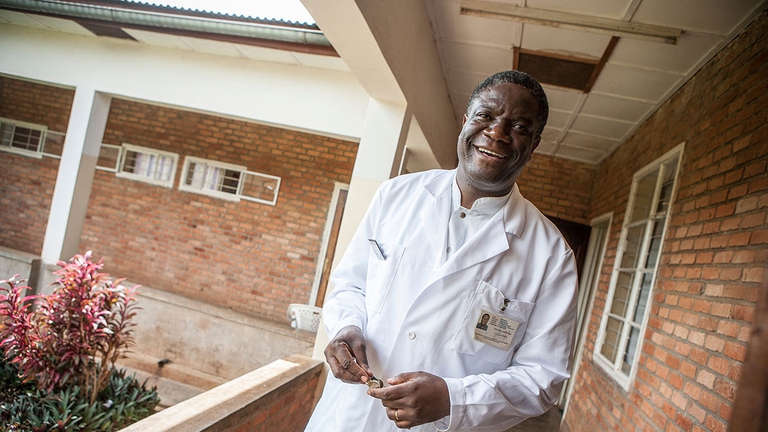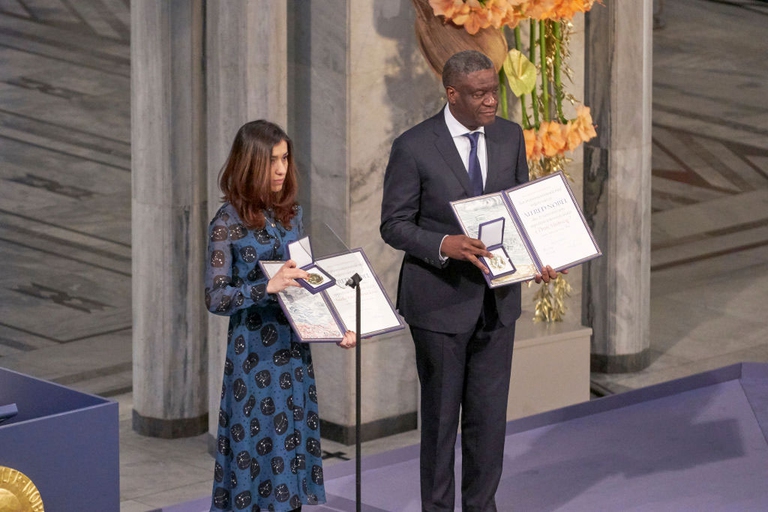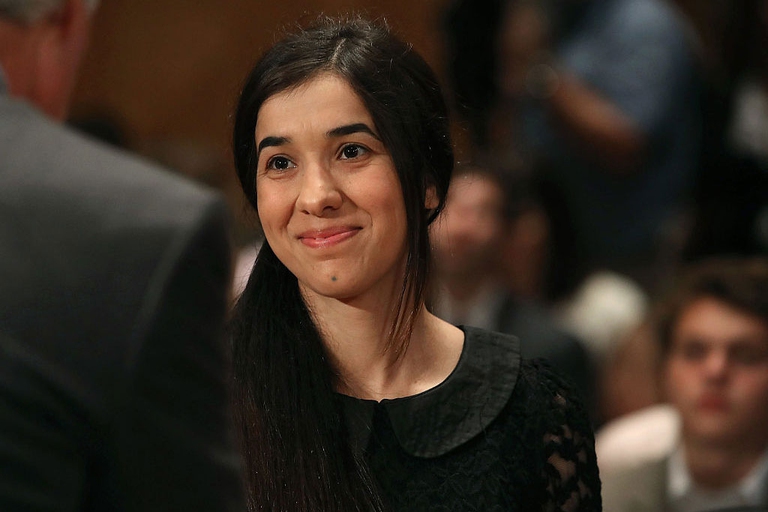
Denis Mukwege received the 2018 Nobel Peace Prize seventy years after the Universal Declaration of Human Rights was adopted. While taking care of women who had been raped by Congolese soldiers, he saw atrocities he doesn’t want to hide.
Denis Mukwege, who was awarded the Nobel Peace Prize in 2018, is known as the “doctor who mends women” because in his hospital in Africa he healed thousands of rape victims, in their body and soul. We interviewed him in Milan.
He’s one of those people who communicate peacefulness just by looking in their eyes. Without having to say a word. It’s like their aura is an ointment for the wounds that were inflicted upon your heart. A person who is able to restore your faith in mankind, making you realise that there really are people who only want to do good.
That is why it is unavoidable to feel charmed when doctor Mukwege finally walks inside the Alberione Auditorium in Milan, Italy, despite the inevitable reverence that everyone feels towards a Nobel Prize winner and the trepidation experienced while waiting to interview him. His face is smiling, his hand outstretched to hold yours.
The first question that spontaneously arises is: “How can someone who has witnessed such atrocities be able to still sleep at night?” The answer of Denis Mukwege, 2018 Nobel Peace Prize winner, is simple: “I believe in change. Otherwise I would have already stopped fighting.”
According to Mukwege, having been awarded the prize for his efforts against the use of sexual violence as a weapon of war proves that change is possible. Finally the suffering of Congolese women, who used to be labelled as liars, has been recognised on an international level. And admitting a problem is the first step towards solving it.
Mukwege treated more than 50,000 rape victims at the Panzi Hospital which he founded in Bukavu, his hometown in the Democratic Republic of Congo. The women who had been raped by soldiers during civil wars or one of the conflicts that continuously arise because of the nation’s mineral resources were able to recover thanks to the holistic model which the doctor developed, aimed at mending both physical and psychological wounds.
I am sure that Congolese people would be able to climb mountains if they believed it was possible. They just need to know that change can happen.Doctor Denis Mukwege, 2018 Nobel Peace Prize winner
This prize was awarded as an invitation not to remain silent. Finally “the fact that shame can be directed at the aggressor instead of the victim is a revolution that we can expect to see within our societies.” But it doesn’t end here. The meaning of masculinity is changing: as former US president Barack Obama said: “Being a man doesn’t mean having eight women around you twerking. Being a man is first and foremost being a good human.” With their weaknesses and their feelings. With their need for love, but without having to show they’re better. Because the best are the ones who help others excel, just like Mukwege.
How would you define positive masculinity?
Masculinity is something we acquire through our familial education and in our societies in which men are encouraged, for example, not to have feelings. Men are encouraged to be very strong. I think this construct of masculinity, which is a toxic masculinity that oppresses women, actually normalises violence in our society.
I believe that if we want to create a form of masculinity that is positive, it must be one that considers women and men as equals. A masculinity that accepts that men can experience weakness, that men too can have weaknesses. This masculinity simply accepts that it exists within the context of gender equality: this is how society can progress.
What did you feel when you received the Nobel Prize in Oslo?
When I received the Nobel Prize I definitely felt satisfied with respects to the denial that has existed in our country for the last twenty years. [A country] in which women suffer tremendously, but in which their pain isn’t recognised. I think this international recognition of Congolese women’s suffering is something we should be satisfied of because we think a problem can’t be solved if it isn’t recognised first. If you don’t acknowledge it, you can’t solve it.
My encounter with Nadia Murad, who I had already met… She really impressed me since what allows sexual violence to exist in our societies is silence. Because when women are raped, they’re forced by their persecutors to remain silent, they’re threatened with blackmail to stop them from speaking out. I think that when women learn to break the silence, we’ll have a huge weapon against violence. Nadia Murad broke the silence, and did so under exceptional conditions. She comes from Iraq, where rape is punishable with death, but she had the courage to speak out and I believe that today we’re on the right path: many women report violence I think that turning shame on its head, directing it at the aggressor instead of the victim, represents a revolution that we can expect to see within out societies.
How can you bear the pain that your patients share with you every day?
It’s hard, very hard because I think that, as I just said, if we wish to keep our humanity intact, we must also preserve our feelings. And I think the young women I meet are often people who have lost their femininity because of the wounds inflicted upon them when they were raped. And when they reach adulthood, they’re left deprived of their femininity. Because it has been completely destroyed. For a girl who has lost her childhood and femininity, dealing with the pain is very, very hard. But today we’ve developed a holistic model that isn’t only medical, it also includes a very important psychological aspect. We support these women so that they may become self-sufficient. Socially and economically. We’re also with them in court, this allows them to recover their dignity. Managing this is difficult but also very effective, because after these girls are able to abandon these models through the four pillars we find they’re able to be strong again. And they also become agents of change within their societies.
Siamo anche su WhatsApp. Segui il canale ufficiale LifeGate per restare aggiornata, aggiornato sulle ultime notizie e sulle nostre attività.
![]()
Quest'opera è distribuita con Licenza Creative Commons Attribuzione - Non commerciale - Non opere derivate 4.0 Internazionale.
Denis Mukwege received the 2018 Nobel Peace Prize seventy years after the Universal Declaration of Human Rights was adopted. While taking care of women who had been raped by Congolese soldiers, he saw atrocities he doesn’t want to hide.
La giornata dell’Onu rimarca l’importanza della Dichiarazione universale dei diritti umani celebrando e promuovendo tali diritti.
L’obiettivo della giornata è quello di contrastare una piaga che affligge ancora il 35 per cento delle donne nel mondo. Sono però numerosi gli esempi di donne che si oppongono alla violenza e lottano per la libertà.
The European Parliament has voted in favour of the European Citizens’ Initiative My Voice, My Choice, calling for safe and accessible abortion across Europe. The next step now lies with the European Commission, which is expected to develop concrete measures.
Montevideo’s Senate has passed a new law allowing ‘death with dignity’ (but not assisted suicide), with the procedure permitted even just a few days after the request.
From Nepal to Morocco, from Madagascar to Peru, many antigovernamental protests that took place these weeks were led by Gen Z protesters.
As per tradition after 12 years India held Mahakumbh, the world’s largest spiritual congregation that has been attracting pilgrims from across the globe.
Workers in tea gardens of West Bengal, India, that produces Ctc tea for domestic consumption complain that they have been devoid of basic facilities while political parties make hollow promises during every elections which are never fulfilled.
India is in the middle of the elections, but sadly none of the politicians have uttered a word on man-animal conflict that has been devouring several lives every year.










